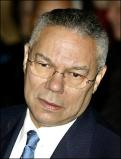Powell Returns to Old Priority in Sudan
By Jonathan Wright

Sensing a possible success for U.S. diplomacy, Powell will fly from Bangkok to Nairobi to meet representatives of the Sudanese government and southern rebels, who are deep in peace talks in the Kenyan town of Naivasha.
U.S. officials have played down expectations he can pull off a final agreement when he sees the negotiators on Wednesday but they say they hope he can speed up the talks so that they come to fruition within weeks.
“The negotiations have reached a point where I think it’s safe to say they’re close, and the belief was that the secretary’s visit could facilitate progress,” State Department spokesman Adam Ereli told reporters in Washington. “This is an opportunity for the parties to seize the momentum.”
A peace agreement in Sudan could transform relations between the United States and Sudan, which the State Department lists as a “state sponsor of terrorism” because of the government’s record of protecting militant Islamists.
In 1998 the United States fired missiles at a factory in Sudan which it said was involved in making components for chemical weapons and was partly financed by Osama bin Laden, the Saudi-born militant hosted by Sudan from 1991 to 1996.
The negotiators have already agreed on security aspects of a peace accord and are working on how the north and south should share power and the wealth generated by oil production.
A complete agreement would end a conflict that first broke out soon after Sudanese independence in 1956 and has raged for most of the intervening years.
It pits the government in Khartoum, dominated by Arabs and Muslims, against non-Muslim southerners who want more autonomy and a greater say in the central government.
MORE THAN 2 MILLION DEAD
More than 2 million people have been killed in the last phase of the fighting, launched by renegade Sudanese army colonel John Garang and his Sudan People’s Liberation Army in 1983. The biggest killers have been the disease and famine which the war has brought in its train.
Powell said early in 2001 the Bush administration had a deep commitment to peace in Sudan. He went to Africa within months of taking office and offered the Sudanese government better relations if Sudanese forces stopped bombing southern villages.
President Bush appointed a special envoy for Sudan and set up a special unit in the State Department devoted to it.
One of the major incentives at the time was the relentless lobbying by conservative Republicans and Christian groups, who took a strong line against the Islamist-dominated government and wanted Washington to tip the balance in favor of the rebels.
U.S. efforts made slow progress at first but the State Department pressed on behind the scenes, despite the distractions of so far fruitless Middle East diplomacy and wars in Afghanistan and Iraq since the Sept. 11, 2001 attacks.
A senior U.S. official said this month Washington would take a good look at removing Sudan from its list of state sponsors of terrorism if the government and rebels come to terms.
The United States could also take a quick decision on sending an ambassador to Sudan as a sign of improved ties.
